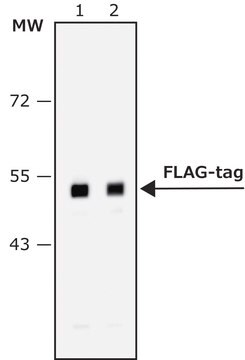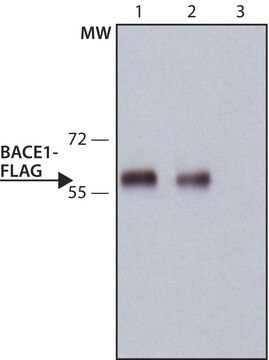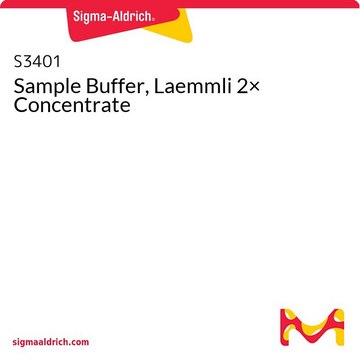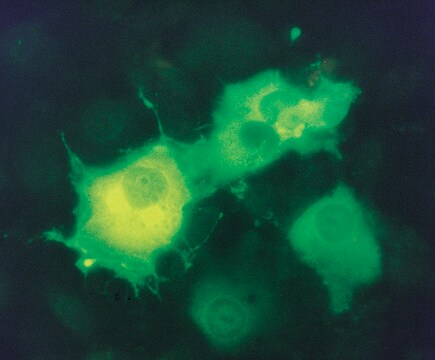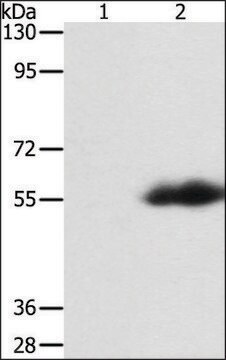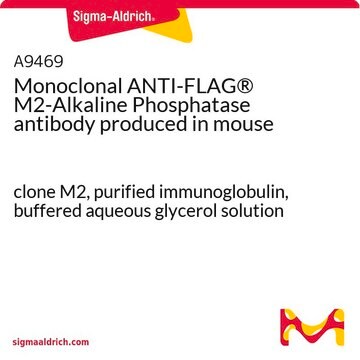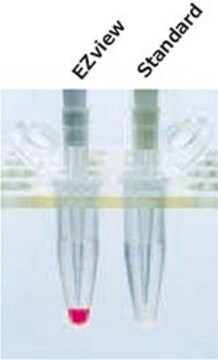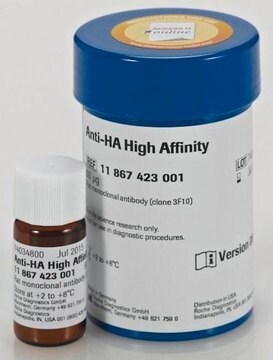SAB4200119
Monoclonal Anti-FLAG-Peroxidase antibody produced in rat
2-4 mg/mL, clone 6F7, purified immunoglobulin
Synonym(s):
Anti-ddddk, Anti-dykddddk
Sign Into View Organizational & Contract Pricing
All Photos(1)
About This Item
UNSPSC Code:
12352203
NACRES:
NA.32
Recommended Products
biological source
rat
Quality Level
conjugate
peroxidase conjugate
antibody form
purified immunoglobulin
antibody product type
primary antibodies
clone
6F7, monoclonal
form
buffered aqueous solution
species reactivity
all
concentration
2-4 mg/mL
technique(s)
western blot: 1:1,000-1:2,000 using extracts of transfected cells expressing C-terminal FLAG-tagged fusion protein
isotype
IgG1
immunogen sequence
DYKDDDDK
shipped in
dry ice
storage temp.
−20°C
General description
Monoclonal Anti-FLAG-Peroxidase is a purified immunoglobulin fraction of monoclonal Anti-FLAG (rat IgG1 isotype) isolated from culture supernatant of the 6F7 hybridoma cells grown in a bioreactor, conjugated to horseradish peroxidase (HRP). The hybridoma 6F7 was produced by the fusion of mouse myeloma cells and splenocytes from rat immunized with the FLAG peptide.
The product recognizes N-terminal, C-terminal, and internal FLAG-tagged fusion proteins. It is especially recommended for identifying C-terminal FLAG-tagged fusion proteins.
Immunogen
purified immunoglobulin fraction of monoclonal Anti-FLAG (rat IgG1 isotype) isolated from culture supernatant of the 6F7 hybridoma cells grown in a bioreactor, conjugated to horseradish peroxidase (HRP).
Application
Learn more product details in our FLAG® applications portal.
Monoclonal Anti-FLAG-Peroxidase, recognizes N-terminal, C-terminal and internal FLAG-tagged fusion proteins. The product is especially recommended for identifying C-terminal FLAG-tagged fusion proteins. The product can be used for immunoblotting.
Physical form
Solution in 0.01 M phosphate buffered saline, pH 7.4, containing 0.01% merthiolate.
Legal Information
FLAG is a registered trademark of Merck KGaA, Darmstadt, Germany
Not finding the right product?
Try our Product Selector Tool.
Storage Class Code
10 - Combustible liquids
Flash Point(F)
Not applicable
Flash Point(C)
Not applicable
Choose from one of the most recent versions:
Already Own This Product?
Find documentation for the products that you have recently purchased in the Document Library.
Customers Also Viewed
DongHyuk Lee et al.
Nature communications, 11(1), 1838-1838 (2020-04-17)
Production of reactive oxygen species (ROS) is critical for successful activation of immune responses against pathogen infection. The plant NADPH oxidase RBOHD is a primary player in ROS production during innate immunity. However, how RBOHD is negatively regulated remains elusive.
Joseph J Boyle et al.
The American journal of pathology, 174(3), 1097-1108 (2009-02-24)
Intraplaque hemorrhage accelerates atherosclerosis via oxidant stress and contributes to lesion development and destabilization. Normally, macrophages scavenge hemoglobin-haptoglobin (HbHp) complexes via CD163, and this process provokes the secretion of the anti-inflammatory atheroprotective cytokine interleukin (IL)-10. We therefore tested the hypothesis
Claudia Isabelle Keller Valsecchi et al.
Nature communications, 9(1), 3626-3626 (2018-09-09)
Haploinsufficiency and aneuploidy are two phenomena, where gene dosage alterations cause severe defects ultimately resulting in developmental failures and disease. One remarkable exception is the X chromosome, where copy number differences between sexes are buffered by dosage compensation systems. In
Elizabeth A Libby et al.
PLoS genetics, 11(6), e1005275-e1005275 (2015-06-24)
Most bacteria contain both eukaryotic-like Ser/Thr kinases (eSTKs) and eukaryotic-like Ser/Thr phosphatases (eSTPs). Their role in bacterial physiology is not currently well understood in large part because the conditions where the eSTKs are active are generally not known. However, all
Our team of scientists has experience in all areas of research including Life Science, Material Science, Chemical Synthesis, Chromatography, Analytical and many others.
Contact Technical Service
